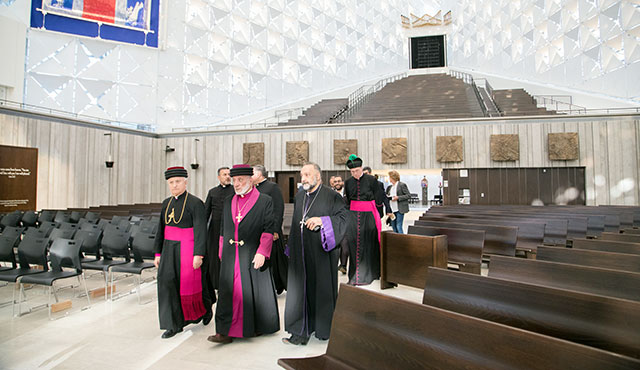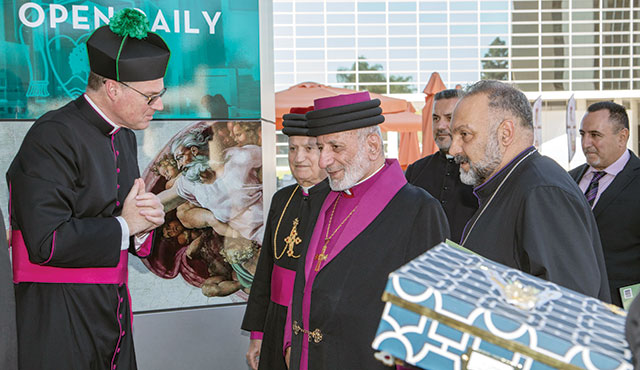On a solemn spring evening, Most Rev. Kevin Vann, Bishop of Orange, stood inside a mosque tucked in a Costa Mesa industrial park. From the minbar, he offered words of comfort and support to the gathered mourners.
“I come as a friend and a believer to let you know of my solidarity,” Bishop Vann said in the wake of the 2019 terror attack that claimed 51 lives of Muslim worshippers in New Zealand. “We must stand firm together. We cannot let fear overcome us, or stop us.”
The ceremony at the Islamic Educational Center of Orange County brought 200 Christians and Muslims together one week after an Australian man with ties to right-wing white supremacist groups attacked worshippers at two mosques in Christchurch during Friday prayer. Bishop Vann’s visit reinforced the Diocese of Orange’s commitment to holding strong relationships with members of other religions and Christian denominations. These relationships aim to find common ground and fight against injustice.
The Diocese’s work to foster strong bonds with other faith groups comes at a time of heightened political polarization along with increased racial and cultural tension across the U.S. Strong relationships with other believers are meant to find common ground and create unity amid a modern society marked by division and hate, Diocese leaders said.
“It is possible to disagree on fundamental and important differences and yet not just be civil, but charitable and do so in friendship,” said Rev. Ed Becker, the diocese’s episcopal vicar of Ecumenical and Interreligious Affairs. “We (spiritual leaders) do it all the time. Maybe what we do can serve as an example across our communities and world.”
Ecumenicism seeks to strengthen ties and build on understanding between different Christian denominations, while interreligious affairs aim to foster ties with believers from non-Christian religions and faiths.
The work of fostering Christian unity is based on the Last Supper, as described in the Gospel of John in the New Testament, when Jesus prays for all believers in his Farewell Discourse with the disciples.
“In literally the last minutes of his earthly ministry before he goes to the Garden of Gesethamane, Jesus points out the importance of Christian unity,” Becker said.
Christian unity and interreligious dialogue were also placed as priorities for the Catholic Church by the Second Vatican Council.
“We’re all Christians, yet we often live parallel lives without recognizing we are brothers and sisters in Christ,” Becker said. “That’s something that needs to be better.”
In the COVID-19 era, building ties with other Christian and religious groups is often done via email, phone and Zoom, rather than in-person meetings at the Pastoral Center. Diocese leaders have regular dialogue with leaders from the Eastern Orthodox Church, the local Jewish community and the Church of Jesus Christ of Latter-day Saints.
“Our conversations are marked by trust and an understanding that we will disagree, but commit to come to agreements on our underlying beliefs,” Becker said. “We recognize that we stand on common ground: There’s no justification for violence, racism and hate.”
At the center of continued dialogue and diplomacy among faith groups will be the Christ Cathedral Campus. Since the dedication of the cathedral in July 2019, the campus is seen as not only the center of Catholicism and evangelization, but as a place for all believers to come together, share mutual understanding and take action on common ground. Prior to restrictions on public gatherings aimed at combating the spread of COVID-19, the campus was regularly visited by high-profile cultural dignitaries and spiritual leaders.
In September 2019, His Holiness Mar Gewargis III Sliwa, the Catholicos-Patriarch of the Assyrian Church of the East, met with Diocese officials at the Pastoral Center after touring the cathedral.
“Christ Cathedral serves as a beacon for people of all beliefs to come together,” Becker said.
Communicating with others who have different beliefs is especially important in areas like Orange County, where communities are increasingly diverse, said Rev. John Monestero, a member of the Diocese’s Ecumenical and Interreligious Affairs Commission for nearly three decades.
“It’s a matter of getting to know your neighbor,” said Monestero, who taught comparative religion at Mater Dei High School for 14 years, and literally wrote the textbook on world religions, “Sacred Journeys”.
Examples abound: Our Lady Queen of Angels Catholic Church in Newport Beach has hosted an evening for Catholic and Muslim families to come together and share a meal. And Imam Dr. Sayed Moustafa Al-Qazwini of the Islamic Educational Center of Orange County was a guest at the dedication of Christ Cathedral.
Conversations with believers from other faiths are not about conversion, but rather developing mutual understanding, finding common ground and working together to combat the social and moral issues of our time, Monestero added.
“So many problems arise from not knowing and being afraid of someone because they’re different,” Monestero said. “Our differences are not things to be afraid of, but to be explored and enriched by.”


